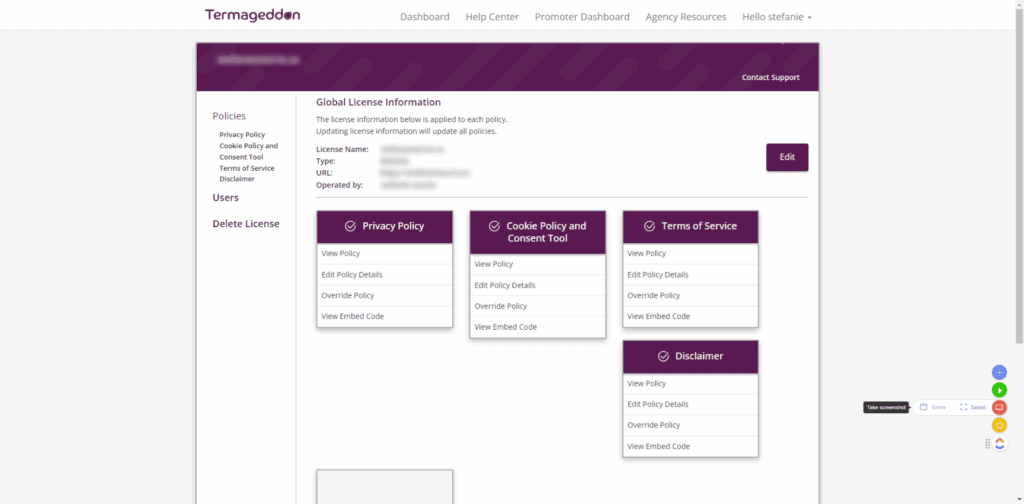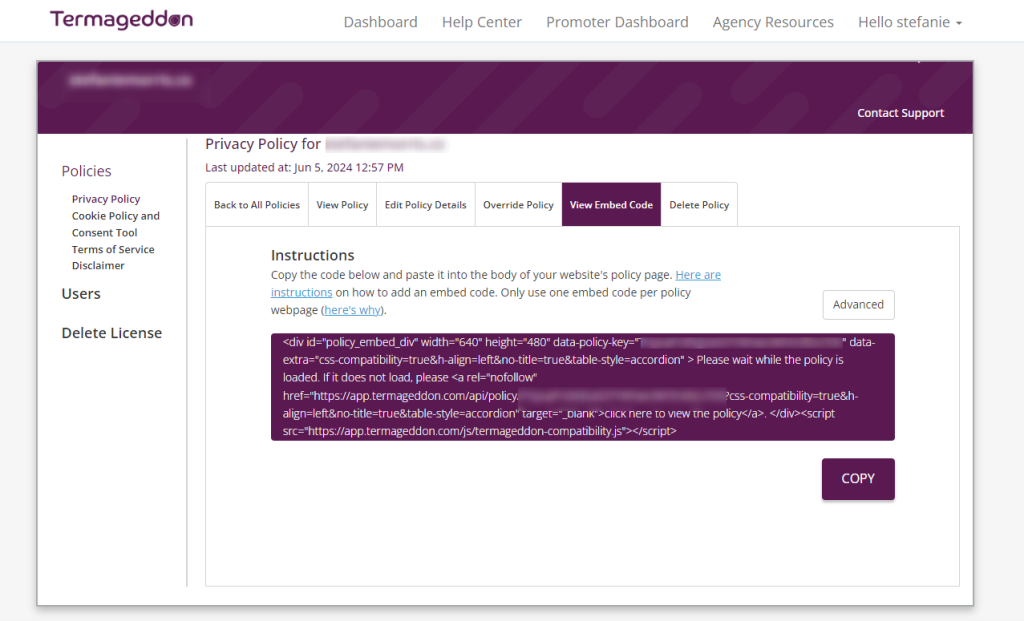Privacy Policy Myths and Facts: A Guide for Businesses
This post 💯 contains affiliate links.
In today’s digital age (wow, that sounds like AI but it was me LOL), privacy policies are crucial for any business that collects personal data. In my opinion, the best privacy policy generator for businesses is the one that auto-updates, Termageddon.
However, there are several misconceptions about what a privacy policy should include and how it should be maintained.
This article aims to debunk these misconceptions, clarify the importance of a comprehensive privacy policy, and how you can use my favorite auto-updating Privacy Policy generator, cookie consent solution, and Cookie Policy generator to help protect your business.
Privacy Policy Misconceptions
Many businesses believe that once they create a privacy policy, their job is done. However, privacy laws and regulations are constantly evolving. A static privacy policy can quickly become outdated, leaving businesses vulnerable to legal risks.
“A Privacy Policy is a One-Time Task”
“Privacy Policies are Only for Large Companies”
“Copying a Privacy Policy from Another Website is Sufficient”
“I don’t need a cookie consent banner because I don’t run ads”
“My cookie banner only needs an ‘okay’/’accept’ button to be compliant”
“I used a free policy generator–it’s fine”
Do I Need a Privacy Policy?
Small businesses often think they are exempt from needing a privacy policy. In reality, any business that collects personal data, regardless of its size, is required to have a privacy policy. This includes collecting email addresses, phone numbers, and other personal information.
If the common privacy policy misconceptions didn’t sound familiar, or maybe you just skipped ahead, here’s the main question I hear: “Do I even need a privacy policy?”
To answer that, run down this checklist:
- Any contact form
- Facebook Pixels
- Google Analytics
- Hotjar/Clarity
- Chat functions
- Recaptcha V3
- Embedded Email Marketing Forms
Give yourself 1 point for each “yes”.
Both businesses and consumers are impacted by misconceptions about privacy policies. Businesses risk legal penalties and damage to their reputation, while consumers may suffer from inadequate protection of their personal data.
Risks of Inadequate Privacy Policies
Failing to maintain an accurate and up-to-date privacy policy can lead to several risks, including legal penalties and fines, data breaches and security incidents, etc… putting your business at risk of damaging your brand reputation.
Lately we’ve seen an uptick in lawsuits over the California Invasion of Privacy Act, or CIPA, for as much as $5,000 per violation. Under this act, CA-based consumers are allowed to sue businesses directly for violations and obtain real damages.
Donata Stroink-Skillrud, Esq, Co-founder and President of Termageddon wrote about CIPA requirements for website tracking. (Donata is a total badass btw, listen to this bio: “She serves as the Vice-Chair of the American Bar Association’s ePrivacy Committee and the Chair of the Chicago Chapter of the International Association of Privacy Professionals.”)
The long & short of it is that you can avoid CIPA violations is to obtain the consent of the user prior to tracking them!
How to Avoid Privacy Policy Risks
To avoid the risks associated with inadequate privacy policies, businesses should regularly update their privacy policies to comply with new laws and regulations. You’ll want each of these:
- Cookies Policy Page
- Privacy Policy Page
- TOS Page (highly suggested)
- Cookies Banner
My favorite way to ensure that my policies stay up-to-date is to use Termageddon to generate and maintain accurate policies.

Termageddon, is the ultimate website policy generator, but what is it & how does it work?
What is Termageddon?
Termageddon is a privacy policy generator-turned dynamic solution. It’s an auto-updating policy generator that helps you maintain privacy policies, terms of service, and cookie policies for better compliance.
How does Termageddon work?
Once you login to your account you will setup your policies. Once the policy is established, you’ll see a screen with a code snippet. Copy that code into the page where your policy lives on your site & you’re good to go!

Termageddon Features & Benefits
Privacy Policy Generator Benefits:
- Legal Compliance: Helps businesses comply with various international and state-specific privacy laws.
- Peace of Mind: Automatic updates ensure continuous compliance without manual intervention.
- Cost-Effective: Affordable pricing with comprehensive coverage.
- User-Friendly: Easy setup and customization make it accessible for non-legal professionals.
Privacy Policy Generator Features:
- Auto-Updating Policies: Policies automatically update as laws change.
- Comprehensive Coverage: Complies with multiple privacy laws including GDPR, CPRA, CalOPPA, PIPEDA, and more.
- Easy Setup: Generate policies by answering a few questions.
- Customizable Policies: Customize policies to your liking without affecting automatic updates. Make unlimited changes to policies at no extra cost.
- Email Notifications: Automatic updates and email notifications for policy changes. Receive alerts when new privacy laws pass in the US, Canada, Europe, and Australia.
Understanding and addressing privacy policy misconceptions is crucial for any business that collects personal data. By using services like Termageddon and staying informed about privacy laws, businesses can protect themselves and their customers from potential risks.
Use https://app.termageddon.com/?fp_ref=smorris to take 10% off your first year’s payment.
Bonus: 5 Things Your Cookies Policy Needs to be Compliant
The key way to avoid these risks is to ensure your Cookies Consent Banner & Cookies Policy are compliant.
- Clear Explanation of Cookies: Describe what cookies are and how they are used on your website.
- Types of Cookies Used: List the different types of cookies your website uses (e.g., session cookies, persistent cookies).
- Purpose of Cookies: Explain the purpose of each type of cookie (e.g., analytics, advertising).
- User Consent: Obtain explicit consent from users before placing cookies on their devices.
- Opt-Out Options: Provide users with options to manage or opt-out of cookies.

